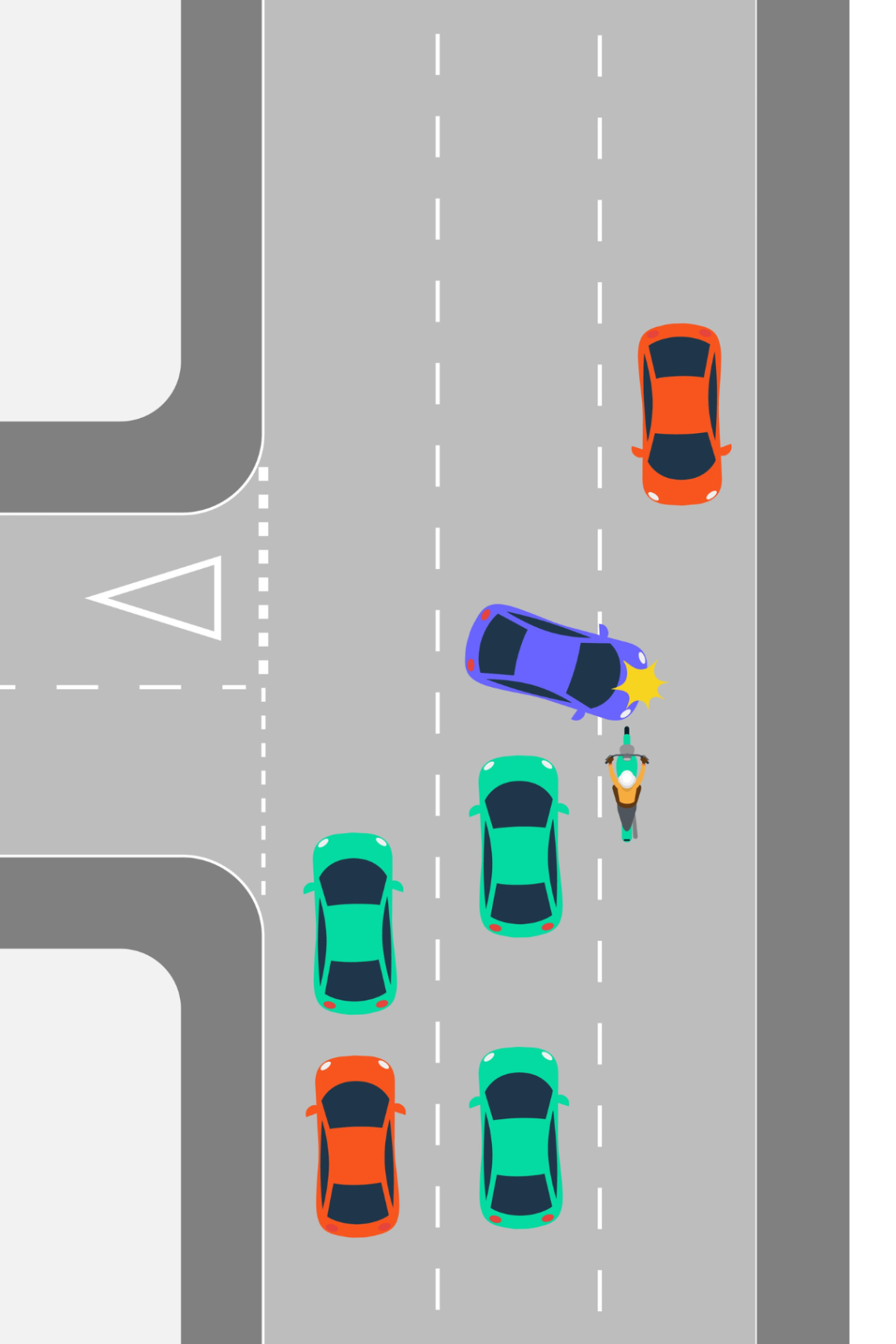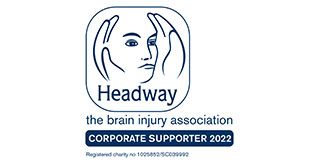Filtering
Filtering is when bikers ride alongside or between lines of slower moving or stationary traffic in order to make progress, either on single or multi-lane highways.
How could I avoid a filtering accident?
Filtering is a legal manoeuvre and is relatively safe, as long as riders pay attention to keep their speed appropriate to the traffic they are moving through, cover their brakes, avoid driver blind spots and look out for drivers changing lanes who haven’t used their mirrors correctly.
Due to the sheer number of cars that riders are overtaking when filtering, the ability to anticipate and react to hazards is a vitally important and potentially life-saving skill. Motorcyclists should avoid filtering past opportunities for cars to pull out, such as side roads, parking spots, areas to use as a turning circle for a U turn etc. Also, if you’re following another, faster rider whilst filtering, do not be tempted to match their speed. Travel at your own pace and plan ahead.
One not so obvious danger of filtering is the risk of aggravating other drivers. This can be caused by motorcyclists using excessive speed when filtering or following aggressive manoeuvres that cause car or van drivers to make evasive actions. For further advice, take a look at our guide to accident-free filtering.
What’s the law on filtering?
Often to the surprise of many other road users, filtering is fully legal in the UK, but it must be done safely and with due care and attention. Filtering requires concentration, skill and practice. The Highway Code acknowledges that motorcyclists will filter but instructs “when filtering in slow-moving traffic, take care and keep your speed low.”
All road users have a responsibility to be aware of the rules of the road and travel responsibly, but an update to the Highway Code in January 2022 recognises that some road users are more vulnerable than others. The concept of the hierarchy of road users recognises that “those in charge of vehicles that can cause the greatest harm in the event of a collision bear the greatest responsibility to take care and reduce the danger they pose to others.”
Therefore, car and van drivers, and those driving larger vehicles need to be particularly careful when it comes to more vulnerable road users, such as motorcyclists.
Case Law on Motorcycle Filtering
Below is an example of case law involving motorbike filtering. It’s important to remember that every case is different and that the circumstances of a case are unique to that particular case.
Jones v Lawton (2013)
The rider was travelling by motorcycle along a main road in Plymouth on the offside of two slow moving lanes of traffic. The driver was turning right from a side road and the traffic in the two lanes stopped to let him out. The driver emerged out into the road but collided with the rider’s left leg, which was so seriously damaged that the rider required above-knee amputation.
The driver argued that the collision was entirely the fault of the rider, saying that he had no option other than to pull out as he did, inching out very slowly to try and get a better view of the road to his right hand side, and that he was in no way at fault. There was considerable independent evidence from various witnesses that the rider had been travelling above the speed limit of 30 mph.
The Court decided that the driver should have been aware of the possibility that a motorcycle was proceeding along the outside of the lines of traffic. It was exactly what any driver should expect a motorcyclist to be able to do in such traffic conditions. A motorcyclist would be unlikely to stop and start in line with other traffic when it was clear to filter past.
Despite the Court concluding that the rider was travelling at 30 mph or a little bit more as he overtook the stationary lines of traffic, the Court decided that the driver was two-thirds to blame for the collision, with a reduction of only one-third against the rider in respect of his own contributory negligence.
The driver had caused the hazard by pulling out onto the main road and crossing the path of the motorcycle. The motorcyclist was also at greater risk than the driver of suffering serious injury.


This is a very important case, as it has helped to overcome what had previously been the traditional view that a motorcyclist should take at least 50%, or even full blame in similar circumstances.
It is interesting to note that the 2022 changes to the Highway Code follow the same broad principles laid out almost 10 years earlier in Jones v Lawton, by acknowledging that there is a hierarchy of vulnerable road users, with motorcyclists being particularly at risk when they encounter dangers created by cars, vans and larger vehicles.
As in all cases, success or failure will hinge on their particular circumstances. No two cases are the exact same, but caselaw such as Jones v Lawton can be very persuasive when applied in the right situations.
How do solicitors fight a motorbike filtering case?
In motorcycle filtering accidents there are often attempts to blame the biker. Speed plays an important role in these cases, and it might be argued that the biker was travelling too fast in relation to the rest of the traffic and when taking into account the specific road conditions. It might also be argued that the rider may have put themselves in a dangerous position by filtering, or that it was obvious a third party was about to turn due to their road position or use of an indicator.
However, the experience we’ve gained from representing thousands of injured motorcyclists can help counter the common arguments used against bikers, by digging into the evidence for a more accurate representation of the events. Road position can be particularly important in these types of cases, as well as the damage to the third-party vehicle, which can help determine liability. We’ll use the evidence available, along with our expertise in this area to fight your corner and achieve the best possible outcome.
Why Biker SOS?
By choosing Biker SOS you’re choosing the motorbike accident specialists. We’ve handled 1 in 6 motorbike claims in the last 5 years alone – making us the largest specialist provider in the country.
We’ve handled hundreds of motorbike filtering claims, so we know the law in this area inside out. Our expert team will fight your corner and get you the compensation you deserve, supporting you throughout your claim, as well as your rehabilitation and recovery.
No Win No Fee
We understand the devastating impact a motorcycle accident can have on your life and the financial pressures it can bring, so we handle your claim on a No Win No Fee basis, meaning you won’t pay anything upfront to start your claim.
We’ve secured millions of pounds for thousands of motorcyclists
Types of Motorbike Accidents
Undertaking
Are motorbikes allowed to undertake? Although generally discouraged, according to The Highway Code, motorcyclists are allowed to undertake other road…
Bike/bus lanes
How to avoid a bus lane accident Buses stop and pull away regularly to allow passengers on and off. In order to avoid accidents, motorcyclists must plan…
Dropping the bike
Can I make a claim after a dropped motorbike accident? If another road user causes you to drop your bike and injures you, then there may be cause to…
U-turn from a car
How to avoid a U-turn accident On high-speed multilane roads or dual carriageways with turning areas, motorcyclists need to be extremely cautious where…
Potholes
Potholes can cause a motorbike rider to have what is known as a ‘tank slapper’, which is when the front end of the bike violently shakes from side to side,…
Road debris / spillages
Knowing that the road ahead is clear of obstructions and how much grip is available can determine the rider’s ability to stop, speed up or change direction…
Junctions
Why do most motorbike accidents happen at junctions? There are many reasons why most motorcycle accidents happen at junctions but typical causes can include…
Animals and Children
How does this type of accident happen? Motorbike accidents can happen when animals or children run into the path of a motorcyclist, causing the biker…
Hit and run
Drivers who flee the scene of an accident are often uninsured or aware that they were at fault. Being run-off the road by a driver who fails to stop, but…
Car door opened into path
How do car door motorcycle accidents happen? Often known as dooring, this type of motorcycle accident is unfortunately all too common. Either the biker…
Motorbike accident abroad
What happens if I have a motorbike accident abroad? With the promise of fantastic weather, stunning scenery and quiet roads, continental Europe has lots…
What to do in an accident?
How the claims process works.
You're in safe hands










